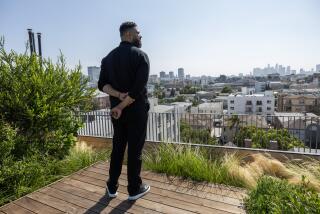A Growing L.A. Ministry Extends a Helping Hand
For two days after Hurricane Katrina made a ruin of his New Orleans neighborhood, David Mince, 50, waited on the roof of his flooded 9th Ward house, eating Spam and crackers, watching dead cats, dogs and humans float by, and waving to helicopters until one finally rescued him.
A few days later at a Baton Rouge shelter, his surreal week took another strange turn. A representative of the Dream Center, a Christian ministry based at the former Queen of Angels Hospital near Echo Park, offered Mince a free Lear jet ride to Los Angeles.
Within hours, he’d arrived in Southern California, where he was offered free room, board and medical care for a year. He picked out a free wardrobe of new clothes. A Dream Center volunteer helped him look for work as a marine electrician.
All the while, Mince said, he waited for a catch. But it hasn’t come. There have been no mandatory church services. No required Bible studies. No religious tracts or talk of Jesus.
“People say, ‘It’s a cult, it’s this, it’s that,’ ” said Mince, wearing a new black T-shirt, jeans, underwear, socks and hat. “The proof is in the pudding. They haven’t stopped giving to us. They put dreams back in my life.”
For the last 10 years, the Dream Center -- an Assemblies of God church that is also supported by the International Church of the Foursquare Gospel -- has ministered to L.A.’s poor, sick and homeless.
That ministry, along with the center’s massive facility, Dream Center officials say, has put the group in a perfect position to assist with hurricane relief.
“This clicks so well with our vision: ‘They may not have anything, but they are worth something,’ ” said Gina Hanley, a worker at the ministry.
Already, the Dream Center has taken in 200 hurricane survivors, mostly families who indicated to center volunteers in Louisiana that they would be interested in relocating. They have been promised care for at least 12 months. Center officials say they have room for as many as 300 evacuees, a number they expect to reach by Sunday.
Just how they will pay for the care they’ve promised the arrivals, though, is still not entirely apparent. Pastor Matthew Barnett, a 31-year-old with a baby face and a crew cut, said he “stepped out in faith” when deciding to host the evacuees, confident that God would provide even though the center had been struggling just to meet its pre-Katrina monthly budget of about $550,000.
“We could miss God if we didn’t do this,” said Barnett, who added that donations from individuals and businesses have more than kept pace with the center’s evacuee-related needs so far.
In the past, the Dream Center has pulled together operating revenue through fundraising speeches around the country, grants, individual contributions coming in through its website or television show on Trinity Broadcasting Network and donations from other churches and businesses.
Since the Dream Center made public its plan this week, lines of cars and trucks, filled with food and supplies, have formed outside its headquarters. People have stopped by with $100 bills or called in with pledges to sponsor families for six months. Trinity Broadcasting Network donated $100,000 to assist with hurricane relief. Twenty-nine corporations had representatives at a job fair for evacuees at the center Friday, and government officials have set up tables there to get benefits flowing.
Politicians and celebrities have also found the center this week, including television’s Dr. Phil McGraw, who has offered two families rent-free housing.
Assisting victims of Hurricane Katrina is an extension of the Dream Center’s philosophy of spreading the Christian message by works, not words. “Since we’ve gotten here, they’ve showed us nothing but mad, mad love,” said Teaaka Burton, 28, who is staying at the center with her fiance, Darren Fountain, and their two children, ages 6 and 1.
This silent form of evangelizing has helped fuel the church’s rapid growth -- from a few members in 1994 to the more than 7,000 worshipers who attend several services throughout the week, about 400 volunteers and an annual budget of more than $6 million, according to church figures.
It has also made the Dream Center a national model for Pentecostal and other churches, which have found that younger Christians often want to see the tangible results of their faith.
“Increasingly, there is an emergent form of Pentecostalism that balances [proselytizing] with Jesus’ proclamation to love others as yourself,” said professor Donald E. Miller, executive director of USC’s Center for Religion and Civic Culture. “They affirm that God’s love is unconditional and therefore their service to other people should, likewise, be unconditional.
“If this expression of the Christian message results in people committing their lives to Jesus, so be it,” Miller added. “But Christians are first of all called to be servants to others, not propagandists.”
S. Scott Bartchy, director of UCLA’s Center for the Study of Religion, said he believed that it would be wrong for a faith-based group to make any aid or support contingent on converting to, or even listening to, the group’s views on religion.
But he sees no ethical concerns with faith-based groups initiating dialogues with disaster victims about religion.
“There may well be people who say that such a catastrophe shows that God doesn’t exist or doesn’t care. I think a catastrophe brings up the issues of the meaning of life acutely, and I imagine there are many discussions about that. In fact, I think those conversations are inevitable,” said Bartchy, a professor of religious history.
Still, he cautioned, “it would be wrong to take advantage of people at a time of crisis.”
Church officials acknowledged that they would be pleased if the evacuees and others became born-again Christians, but their assistance is offered with no strings attached.
“The philosophy here is to help people because they are made in God’s image,” said Eric Brockhoff, who works in the center’s Hope for Homeless Youth agency, which provides services for prostitutes, gang members and drug addicts. “We hope they will find God, but that’s really up to them. We’re not manipulating people or buying them. We’re just serving them.”
Church officials see their role in helping the evacuees as providential and hope that their plight might raise awareness -- and money -- for others with similar needs in Los Angeles.
Only seven floors of the former Queen of Angels building are in use, with room for about 700 people. Renovating the other eight floors, which would provide 1,500 additional beds, would cost $8 million, church officials said.
“We could fill all those rooms today,” Barnett said.
The Dream Center was established in 1994 when Barnett, a 20-year-old Assemblies of God pastor, took over Bethel Temple in Echo Park. His co-pastor was his father, Tommy, an Assemblies of God minister who headed a church in Phoenix and now splits his time between the Phoenix and Los Angeles churches.
Following what was then traditional wisdom, the younger Barnett improved the choir, spruced up the building and worked on crafting stirring sermons.
But after his congregation of 18 dwindled to nine, he was forced to try something different. He asked people in the neighborhood how the church could serve them. From that sprang ministries to addicts, immigrants and the homeless.
One of the church’s first programs was “Adopt-a-Block,” in which volunteers went into some of Los Angeles’ poorest neighborhoods and simply asked, “Is there something I can do for you?” After overcoming initial skepticism, the volunteers have cleaned houses, done electrical and plumbing work, painted, mowed lawns, watched children and provided food, diapers and other supplies.
More than 50 blocks in neighborhoods including Compton, Watts, downtown Los Angeles and Echo Park have been adopted and are tended to weekly.
“You have to earn the right to be heard,” Barnett said.
Many residents of those neighborhoods are now Dream Center members, commuting to services in 30 church-provided buses.
In 1996, in need of more space, the church bought the abandoned Queen of Angels building on 8.8 acres for $3.9 million and named it the Dream Center.
By 2001, the church had again outgrown its sanctuary, forcing it to hold more than two dozen services a week. In an unusual display of cooperation between two denominations, the pastorship of the landmark Angelus Temple -- established by early 20th century evangelist Aimee Semple MacPherson and now owned by the International Church of the Foursquare Gospel -- was given to Barnett. He now had a worship space near the Dream Center that held 3,500 people.
A service there Thursday night attracted 2,000 worshipers, including about 30 hurricane survivors.
After some very loud Christian hard-rock music and hip-hop dancing, Pastor Glen Burris -- a guest speaker and Foursquare Gospel minister -- talked about how Jesus allows people to go from hopelessness to hope.
“If you find your faith under assault, there’s still hope for your life,” Burris told the congregation in a sermon geared to the hurricane survivors. “It is the message of the church.”
The 90-minute service ended with an “altar call” in which Barnett asked people to come forward if they wanted to accept Jesus Christ as their savior or reaffirm their faith if it had been under assault. Most of the 30 evacuees walked to the stage, along with hundreds of other congregants.
“Don’t let the devil ... stop you from seeing the future,” he told them. “What the enemy tried to destroy, God is going to use for good. You want hope? You grab on to the one who invented hope.”
Mince, little more than a week removed from his rooftop vigil in New Orleans, stepped to the stage.
“We’ve been through a tough thing,” he said, hugging Barnett. “Going from hopeless to hope. That’s what happened to us.”
Thomas “T-Bone” Quinn, a New Orleans native, didn’t attend the service Thursday, but he said he would go soon. He hadn’t been to church in four decades, since he was a young child and a strict Baptist preacher scolded him.
In fact, he didn’t have much use for people in general before arriving at the Dream Center on Sunday. The 47-year-old pipe-fitter said he had spent much of his leisure time away from his New Orleans home, at a campsite near a swamp outside the city.
“I didn’t like people and wanted to get away,” he said, grinding out a cigarette with his new Reebok shoes. “But it’s different now. I can’t believe the kindness here. It’s better than true.”
He said that kindness has restored his faith in God.
“I’m not the smartest guy, but I’m not stupid,” Quinn said. “There’s a reason why I am here. I was snatched up and put in this place for a reason. And I’m not going to leave here until I find it.”
Times staff writers Matt Lait and Scott Glover contributed to this report..
More to Read
Sign up for Essential California
The most important California stories and recommendations in your inbox every morning.
You may occasionally receive promotional content from the Los Angeles Times.










